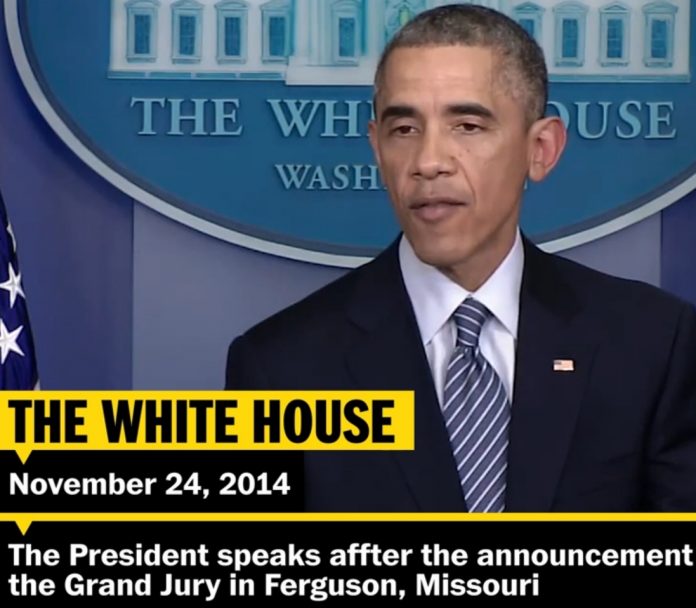
WATCH: (Scroll Down For Video) Despite increasing scrutiny from the press and a bipartisan shift away from tough-on-crime policies, America’s police still have an ally in the Oval Office.
President Obama has long had nice words for law enforcement in his speeches, even as he has addressed cases of alleged police brutality and called for reforms to the criminal-justice system. “Murderers, predators, rapists, gang leaders, drug kingpins — we need some of those folks behind bars,” Obama said to applause at the NAACP’s national conference in Philadelphia last year. “Our communities are safer, thanks to brave police officers and hard-working prosecutors who put those violent criminals in jail.”
It isn’t just rhetoric, as the White House made clear in a report last week. Obama’s economic advisers believe that hiring tens of thousands of additional police officers could have real benefits for society in general, preventing as many as 1.5 million crimes annually.
The report from the Council of Economic Advisers — which is charged with providing the president with research and guidance on economic questions — reveals the differences of opinion between the Obama administration and the many activists who feel that police often do more harm than good.
Obama’s advisers cite extensive research showing that more officers do prevent crime, but criminologists are warning that the data needs to be interpreted with care. Police manpower is one thing. Figuring out how to use it efficiently and strategically, to reduce crime over the long term, is an entirely different question — one that many experts say hasn’t been answered conclusively.
Obama’s advisers, for instance, point out that the United States has about 35 percent fewer police officers than average, compared with the rest of the world and adjusting for the size of the population. They also cite research showing that the presence of police can prevent crime by making potential criminals feel they’re more likely to be apprehended — which is a far more effective deterrent than a lengthy sentence if the offender doesn’t expect to get caught anyway.
Researchers have studied the controversial crime-policy bill that President Bill Clinton signed in 1994 and that he promised would provide the funding to put an additional 100,000 police officers on the street. Economists William Evans and Emily Owens concluded those officers significantly reduced the numbers of motor-vehicle thefts, robberies, burglaries and aggravated assaults in the cities where they were hired.
These officers were especially effective in policing neighborhoods where crime had become rampant, said Franklin Zimring, a criminologist at the University of California at Berkeley.
In particular, police closed down the public drug markets that were common until recently in cities such as New York, Baltimore and Seattle. Disrupting those markets required sustained vigilance — and manpower, Zimring said. He added that while this strategy didn’t necessarily reduce sales of drugs (since many sellers moved indoors, where they relied on technology to connect with customers), it did prevent dealers from feuding violently with each other over control of public places.

